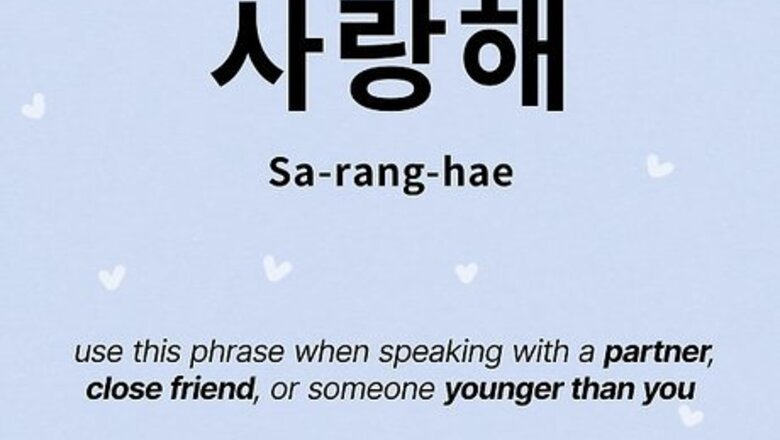
views
- Sa-rang-hae is the casual way to say “I love you,” and is what you’d say to your friend, partner, or someone younger than you.
- Sa-rang-hae-yo is the polite way to say “I love you”—it’s the phrase you might use when talking to your parents or teachers.
- Sa-rang-hap-ni-da is the most formal way to say “I love you.” You’d use this form of the phrase when speaking to a person of a much higher social rank.
- Sa-rang-haeng is a really cute way to say “I love you.”
Ways to Say “I Love You”
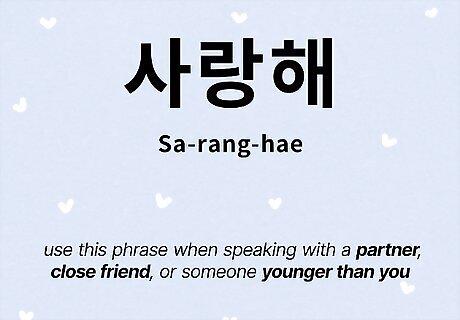
Sa-rang-hae (사랑해)Sa-rang-hae is an informal form of the verb “sa-rang-ha-da,” which comes from sa-rang (사랑), the Korean word for “love,” and ha-da (하다), the Korean verb “to have/do.” You’d use this variety of “I love you” when speaking with a partner, close friend, or someone younger than you. When calling someone by name using the casual “sa-rang-hae,” add an “ah” (아) suffix to the person’s name if it ends in a consonant or a “ya” (야) suffix if it ends in a vowel. “Sa-rang-hae, Su-a-ya” (사랑해, 수아야) translates to “I love you, Sua.” Since “Sua” ends in a vowel, the “ya” suffix is added. “Sa-rang-hae, Ye-jun-a” (사랑해, 예준아) translates to “I love you, Yejun.” Because “Yejun” ends with a consonant, the “ah” suffix is added. Korean is a contextual language where pronouns like “I” and “you” are often implied rather than actually said.
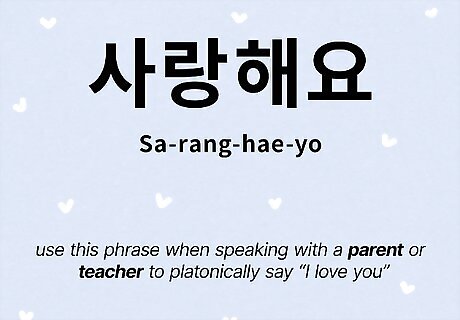
Sa-rang-hae-yo (사랑해요)Just like “sa-rang-hae,” “sa-rang-hae-yo” also stems from “sa-rang-ha-da,” the Korean verb for “to love.” This version of “I love you” is polite, and is what you’d use to platonically say “I love you” to someone like a parent or teacher. If you’re calling someone by name with sa-rang-hae-yo, add the “ssi” (씨) suffix to their first or full name as a sign of respect. “Sa-rang-hae-yo, uh-muh-ni” (사랑해요, 어머니) translates to “I love you, mom.” (You don’t need to add the “ssi” suffix when you’re talking to someone like a parent or teacher—instead, just use the normal title.) “Sa-rang-hae-yo, Min-seo-ssi” (사랑해요, 민서씨) translates to “I love you, Minseo.”
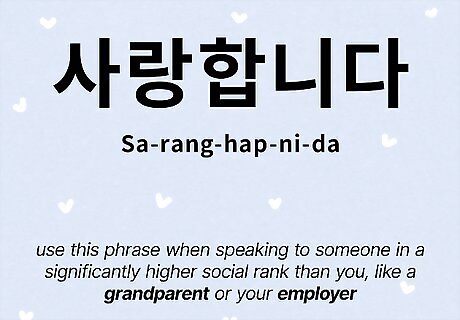
Sa-rang-hap-ni-da (사랑합니다)While still a version of the “sa-rang-ha-da” verb, sa-rang-hap-ni-da is far more formal than “sa-rang-hae” or “sa-rang-hae-yo.” You only use this phrase when speaking to someone in a significantly higher social rank than you, like a grandparent or your employer. Just like with “sa-rang-hae-yo,” add the “ssi” (씨) suffix when referring to someone by their name. “Sa-rang-hap-ni-da, hal-meo-ni” (사랑합니다, 할머니) translates to “I love you, grandma.” “Sa-rang-hap-ni-da, Ji-yun-ssi” (사랑합니다, 지윤씨) translates to “I love you, Jiyoon.” Learn romantic phrases for real conversations. "I wanted to learn Korean, so I could talk to my girlfriend in a more heartfelt way. The article gave me actual romantic phrases I can use, not just stiff textbook sentences. Now, I can say things like "I miss you" or "I can't live without you" in a way that sounds natural but still romantic. It really brings us closer when I can express my feelings in her native language." - Peter T. Tailor your speech to show respect. "I used to feel awkward talking to my Korean girlfriend's parents since I didn't know the right level of formality to use. This article explained how speaking casually to your friends is different than talking politely to parents and elders. Knowing when to use formal phrases helps me make a good impression on her family and show respect." - John Kervy B. Practice pronouncing loving words. "As someone just starting to learn Korean, I found the tips on how to pronounce "I love you" super helpful. I was able to practice saying the phrases out loud, thanks to the breakdown of the sounds. My speaking skills have definitely improved from repeating these loving words until I get the pronunciation just right." - Joyce S. Use pet names for sweetness. "I loved learning classic Korean pet names to call my partner. Sprinkling in words like "jagiya" (baby) and "nae sarang" (my love) adds some cute romance to our daily conversations. It's a simple way to surprise him and keep things feeling sweet." - Kitty B. Did you know that wikiHow has collected over 365,000 reader stories since it started in 2005? We’d love to hear from you! Share your story here.
How do you say “I love you” in Korean in a cute way?
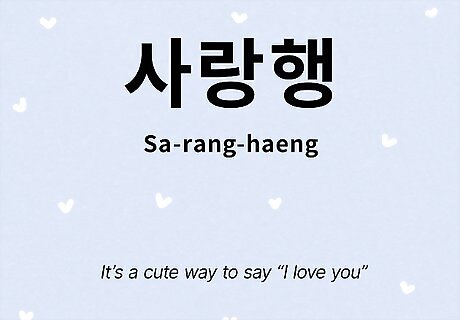
Sa-rang-haeng (사랑행) is a cute way to say “I love you” in Korean. “Sa-rang-haeng” takes the casual “sa-rang-hae” and replaces the “hae” ending with the “haeng” suffix. For some, the “haeng” sounds especially “aegyo” (애교), or cute.
Romantic Korean Phrases

Jo-a-hae-yo (좋아해요): “I like you”“Jo-a-hae-yo” stems from “jo-a-ha-da” (좋아하다), the verb “to like.” It’s a great way to share your feelings with a romantic interest in your life without sounding too intense. Like “sa-rang-hae-yo,” “jo-a-hae-yo” also has different formality levels: Informal: Jo-a-hae (좋아해) - what you’d say to a best friend or someone who’s around the same age/younger than you Polite: Jo-a-hae-yo (좋아해요) - what you’d say to someone who’s a few years older than you or someone you don’t know well Formal: Jo-a-hap-ni-da (좋아합니다) - what you’d use in a formal setting (like with a teacher or employer)
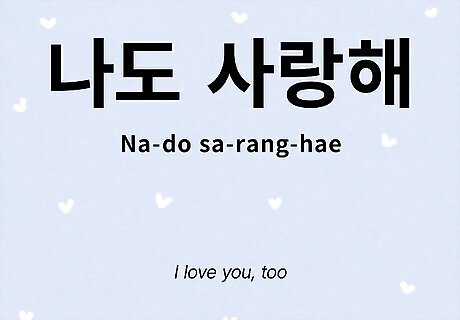
Na-do sa-rang-hae (나도 사랑해): “I love you, too”Let’s say that your partner just said “sa-rang-hae” (I love you) to you. In response, you could say “na-do sa-rang-hae,” or “I love you, too.” Person:1: Sa-rang-hae (사랑해)!Person 2: Na-do sa-rang-hae (나도 사랑해)!
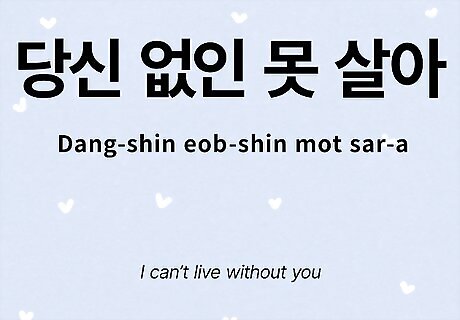
Dang-shin eob-shin mot sar-a (당신 없인 못 살아): “I can’t live without you”Want to take your romantic confession to the next level? Say “dang-shin eob-shin mot sar-a” instead of (or in addition to!) “sa-rang-hae.” It translates to “I can’t live without you,” and is a pretty powerful way to pull on someone’s heartstrings.
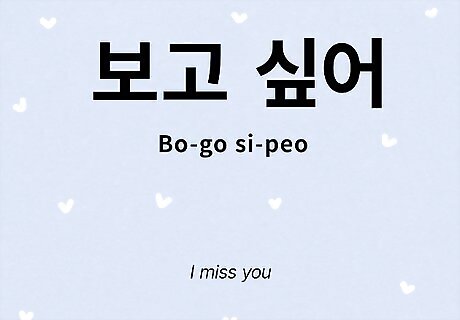
Bo-go si-peo ( 보고 싶어): “I miss you”Can’t wait to see your partner again? “Bo-go si-peo” is a great, informal way to let them know they’re on your mind.


















Comments
0 comment